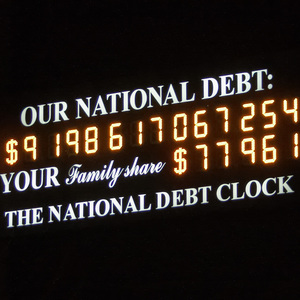In 1835, the United States had a completely unique moment in its history–for exactly one year, the country had no debt. Making America debt-free was something of an obsession for then-President Andrew Jackson, who sold off government-owned land and vetoed federal spending in order to pull the country out of the red. Listen to hear about Jackson’s attitude toward debt, the fiscal policy he imposed, and some of the unforeseen consequences of that policy.
Listen to the story
RENEE MONTAGNE: You know, politicians have been fighting over the U.S. debt since the United States was born. This country has always owed money to someone, except for one year: 1835, the only time in U.S. history the government has been completely debt-free.
Robert Smith from NPR’s Planet Money team tells the story.
ROBRT SMITH: Let’s start with the happiest day: January 8th, 1835. All the big political names in Washington, D.C. had gathered to celebrate the president, Andrew Jackson.
A senator stands up and he gives the news: Gentlemen, the national debt is paid. Historians tell us there was quite a huzzah.
Mr. JOHN STEELE GORDON (Author, “Hamilton’s Blessing: the Extraordinary Life and Times of the National Debt”): It was a big deal.
SMITH: John Steele Gordon writes about financial history.
Mr. GORDON: This was another American accomplishment, that we had actually paid off our national debt. No other country had ever done that before.
SMITH: So Andrew Jackson gets rid of the debt. All of a sudden, the country’s running a surplus. And we all live economically happily ever after, right?
Mr. GORDON: Not exactly.
SMITH: How long did the good times last?
Mr. GORDON: It lasted exactly one year.
SMITH: By 1837, the country would be in panic and headed into a massive depression – but we’ll get to that.
First, let’s figure out how Andrew Jackson did the impossible. It helps to remember that debt was always a choice for America. After the revolution, the founding fathers debated whether or not to just wipe clean all those financial promises made during the war.
Robert E. Wright, a professor at Augustana College in South Dakota, argues that they made the right choice by avoided default.
Professor ROBERT E. WRIGHT (Augustana College): It would have ruined our credit and would have left the economy on a very agricultural-subsistence basis.
SMITH: So the United States agreed early on to consolidate all the debts of all the states: $75 million. The U.S. would try to pay down the money it owed during the good times, then it would fight another war, and the debt would go up again. The politicians never liked it.
Mr. WRIGHT: So what the battle was really about was how quickly to pay off the debt, not whether to pay it off or not.
SMITH: But just like today, it wasn’t easy for politicians to slash spending -until Andrew Jackson.
Professor H.W. BRANDS (University of Texas): For Andrew Jackson, politics was very personal. He hated not just the federal debt. He hated debt at all.
SMITH: H.W. Brands is a professor at the University of Texas. He tells the story of how Jackson, out in the Wild West of Tennessee, had been quite a land speculator, until a deal gone bad left him with massive debt and some worthless paper notes. So when Jackson ran for president, he knew his enemy: banks and the national debt. He called it the national curse. People ate it up.
Mr. BRANDS: Debt was considered a moral failing, and the idea that you could somehow acquire stuff through debt almost seemed like black magic.
SMITH: But Andrew Jackson had some magic of his own. There was a huge real estate bubble going on, and the U.S. had a lot of land in the wilderness. So they did a brisk business selling it off. Jackson was ruthless on the budget. He blocked every spending bill he could.
Mr. BRANDS: He vetoed, for example, programs to build national highways. He considered these to be unconstitutional in the first place, but bad policy in the second place.
SMITH: Jackson took office with around $58 million of national debt. Six years later, it was all gone, paid off. But Jackson now faced a problem that no other president has ever had: what to do with all that surplus money. Jackson had already killed off the National Bank, something he hated more than debt, so he couldn’t put the money in there.
Mr. GORDON: And what he decided to do was to divide it among the states, according to the population. This is the only time that’s happened.
SMITH: But John Steele Gordon says the party did not last very long. The state banks went a little crazy. They were printing massive amounts of money. The land bubble was out of control. Andrew Jackson tried to slow everything down by requiring that all land sales needed to be done with gold or silver. Bad idea.
Mr. GORDON: There was a huge crash and the beginning of the longest depression in American history. It actually lasted six years before the economy began to grow again.
SMITH: Now, no one’s saying paying off the debt caused the depression. The bubble was going to pop sometime, and Andrew Jackson just wasn’t savvy enough to do it gently. But the result was that we had to kiss a debt-free USA goodbye. The country never came close again.
Robert Smith, NPR News, New York.
(Soundbite of music)
MONTAGNE: You’re listening to MORNING EDITION, from NPR News.
 © 2011 National Public Radio, Inc. Used with the permission of NPR. All rights reserved.
© 2011 National Public Radio, Inc. Used with the permission of NPR. All rights reserved. Vocabulary
- default (v) – to fail to repay a debt
- subsistence (adj) – a situation in which production stays at a level sufficient for individuals’ own use
- speculator (n) – someone who makes high-risk investments in hopes of selling at a big profit
- bubble (n) – an economic situation in which something is bought and sold for prices far higher than its value
Listening Comprehension Questions
- What did President Andrew Jackson accomplish in 1835 that was unique in American history?
- Why was the United States in debt after the American Revolution?
- Why was Jackson so determined the bring the national debt down to zero?
- What did Jackson do in order to shrink the debt?
- What caused the country to go into debt again?
Discussion Themes
- Do you think the benefits of paying off the debt in 1835 outweighed the sacrifices required to do so? Explain.
- What do you think Jackson and the legislature should have done with the surplus of money after the debt was paid off? Why?
Teacher’s Guide
Activate student knowledge: Open class by asking students what they know about the national debt. Explain that the United States is virtually always in debt. That’s why it’s unusual that there was one year in American history when the country was not in debt. Economists disagree about how important the national debt is. Some believe that government borrowing, like individual borrowing, creates a debt that our heirs will need to repay. They want to shrink the debt, possibly to zero. Others argue that government borrowing creates debt but it also stimulates the nation’s economy. They are less concerned about the country carrying a debt. Politicians latch onto these economists’ debates, and the question of national debt becomes a highly charged, politically partisan topic.
Introduce the story: In this audio story, you will learn about the one time that the United States was debt-free. It was 1835 and Andrew Jackson was president. Listen to why Jackson obsessed about paying off the country’s debts, how he managed to do so, and why the results did not last.
Active listening supports:
The True or False? listening organizer helps students focus their listening.
The Language Identification organizer allows students to follow along and track important phrases while listening to the story.
Reflect on the story: Take time for student reflection on the audio story and discussion questions to check for understanding. Focus students on the costs and benefits of eliminating the national debt.
Paired Text Use the profile of Andrew Jackson from the Museum of American Finance to pair with this audio story. Ask students use what they learn from the museum profile to evaluate the benefits and drawbacks of Andrew Jackson’s drive to eliminate the national debt.


